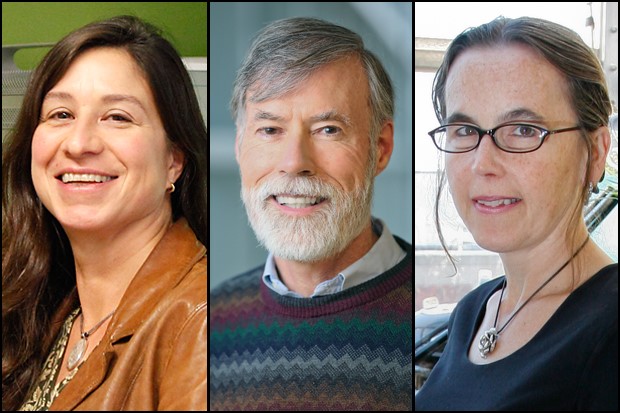American Association for the Advancement of Science honors three Brandeis scholars
The organization named the researchers as Fellows, one of the most prestigious designations in academia.
 Photo: Mike Lovett
Photo: Mike LovettFrom left to right: Gina Turrigiano, Edward Hackett and Leslie Griffith.
Three Brandeis University scientists have been named Fellows of the American Association for the Advancement of Science (AAAS). Election as a AAAS Fellow is an honor bestowed upon AAAS members by their peers for scientifically or socially distinguished efforts to advance science or its applications.
This year’s election of Vice Provost for Research Edward Hackett, Joseph Levitan Professor of Vision Science Gina Turrigiano and Professor of Biology and Director of the Volen National Center for Complex Systems Leslie Griffith brings to 12 the number of current AAAS Fellows at Brandeis. The honor follows October’s announcement that Michael Rosbash, the Peter Gruber Endowed Chair in Neuroscience and Howard Hughes Medical Institute Investigator; and Jeffrey C. Hall, professor emeritus of biology, were awarded the Nobel Prize in Physiology or Medicine.
“Coming on the heels of the Nobel Prize, this recognition and honor for three of our distinguished faculty is yet another affirmation of the enduring impact of Brandeis’ research and discoveries,” said Brandeis President Ron Liebowitz.
Griffith was elected to the neuroscience section for her “distinguished contributions to the field of neuroscience for studies exploring how the nervous system integrates information and generates behavioral outputs,” according to AAAS.
“It is clearly an honor to be elected a AAAS fellow,” Griffith said. “I am happy to be associated with an organization that is doing so much to promote science to the public and to bring science into policy-making discussions in Washington.”
Griffith’s work involves understanding how experience guides behavior. “We are particularly interested in how sleep influences our ability to form memory,” Griffith explained. “My lab works to understand the molecular and cellular pathways that underlie these complex processes since this is the type of knowledge that will be needed to formulate therapeutic interventions for neurological disease.”
Turrigiano was also elected for her pioneering work in neuroscience, “particularly for the discovery of ‘synaptic scaling’ as a mechanism to maintain stable neuronal and circuit function in the brain,” said AAAS.
“I’m very proud to be elected a Fellow of AAAS, an organization that works hard to promote science, education and evidence-based policy,” said Turrigiano, whose work focuses on the mechanisms that stabilize brain circuits, and how these mechanisms break down in neurological disorders such as autism.
Hackett was elected in the section on history and philosophy of science for “distinguished contributions to the sociology of science, especially the study of science and technology policy,” according to AAAS.
“The work of AAAS, especially its representation of science both to the public and to those in power, is vital today, and this recognition obligates me to do more to help with their mission,” said Hackett, who is also a professor in the Heller School for Social Policy and Management. “My research is in the interdisciplinary field of science and technology studies — the science of science. At the moment I am concerned about who will do science in the future, what their jobs will be like, and how science will fit in with other parts of society.”
New Fellows will be presented with an official certificate and a gold and blue (representing science and engineering, respectively) rosette pin on Saturday, February 17, 2018, from 8-10 a.m. CST at the AAAS Fellows Forum during the 2018 AAAS Annual Meeting in Austin, Texas.
Categories: General, Humanities and Social Sciences, Research, Science and Technology





